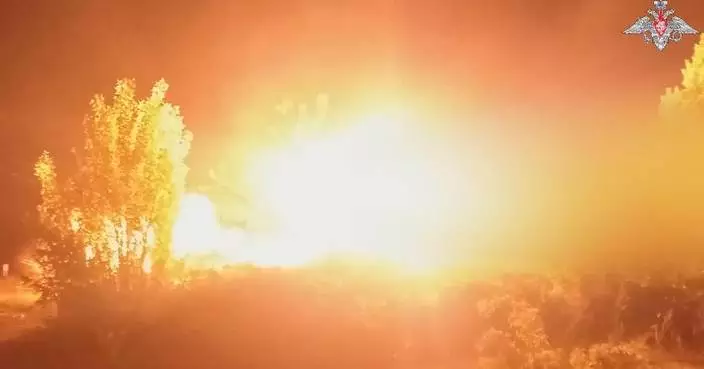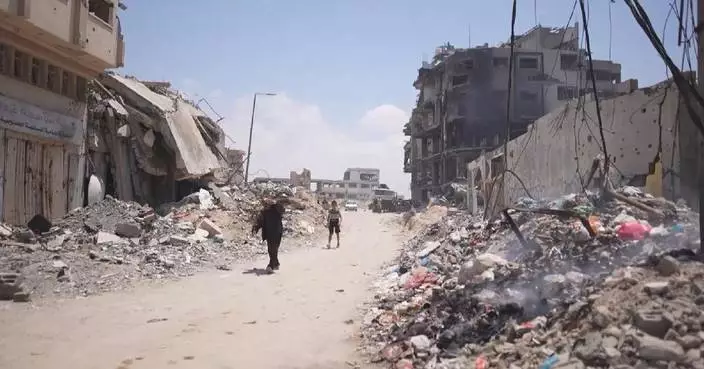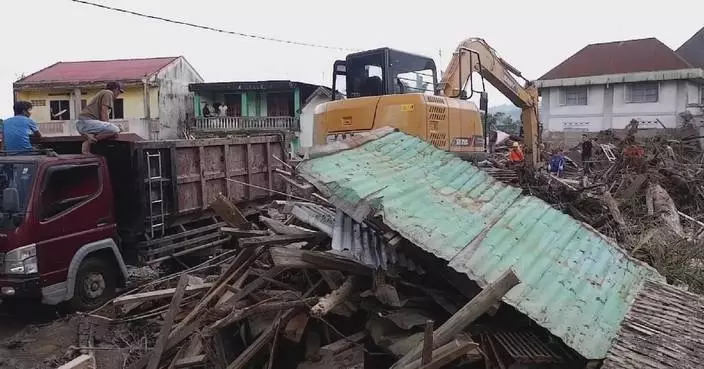The growing anti-war protests against Israel's attacks on Gaza, which have swept across universities in the United States, have invoked mixed emotions among residents in the City of New York.
In the early morning of April 17, a pro-Palestinian protest broke out at Columbia University in the City of New York. Students rallied at the campus, voiced strong support for Palestinians in dire straits.
Afterwards, New York police arrested hundreds of students.
Some of the locals who accepted interviews with China Global Television Network (CGTN) expressed their support for those students and denounced the acts taken by police.
Susan Chandly, one of the interviewees, said she is in full support of students exercising their right to protest, as they are making contributions to a great cause.
"I'm in full support of students exercising their right to protest and it's for a great cause. I think it's really unfortunate and disturbing that there's such a heavy police presence and brutal forces of police brutality on these kids. So it's pretty disappointing. But I think it's great that they're supporting Gaza and all that," Chandly said.
Milly Swan, another interviewee, voiced her concerns over the aggressive actions of the police.
"I support the students and their right to protest, and I don't think that the use of force being used by the police, it shouldn't be used that way. I think they're being too aggressive, and I support the students," said Swan.
However, there are also some disagreements with the protests, with people saying the movement can threaten the safety of other students.
"I think you have the right to protest. You don't have the right to threaten anybody or make any student feel unsafe, which is what is happening," said Marta Gundson.
Donald Heckerson noted that the protests have gone too far and all activities at universities need to comply with certain rules.
"Universities should observe the rules they already have. The activities are far out of line in my opinion. I'm all for free speech, but there has to be some order as well to things. And the threats, that some students feel threatened, I think is something that needs to be addressed as an adult," Heckerson said.

Pro-Palestinian campus protests in US stir mixed emotions among public

Pro-Palestinian campus protests in US stir mixed emotions among public

Pro-Palestinian campus protests in US stir mixed emotions among public
Devastation and despair have gripped the Gaza Strip amid the ongoing Israel-Hamas conflict, as hundreds of thousands of displaced Palestinians now reflect on the biggest disaster the region has seen for decades as the current crisis deepens.
Wednesday marks the 76th anniversary of the Palestinian Nakba day, or the day of "catastrophe", which is observed annually on May 15 to remember the expulsion of hundreds of thousands of Palestinians from their homes after the establishment of Israel in 1948.
In 1948, Israel declared statehood, sparking an eight-month war with a number of Arab states, known as the First Arab-Israeli War. During the war, Zionist forces took control of the western part of Jerusalem, which is considered the holy city for three major religions: Judaism, Christianity and Islam. In 1967, Israel took control of East Jerusalem, the West Bank and the Gaza Strip in the Six Day War, also known as the Third Arab-Israeli War.
After the Madrid Peace Conference in 1991, the Palestinian side gradually reclaimed approximately 2,500 square kilometers of its land through negotiations with Israel.
The Palestinians have long been seeking to establish an independent state with East Jerusalem as its capital city in light of a UN-proposed two-state solution based on the pre-1967 borders.
Now the region is again engulfed in crisis, with the conflict which erupted in October last year proving the deadliest yet, killing over 35,000 Palestinians, and injuring about 80,000 people, while leaving 2 million people displaced amid a severe humanitarian situation.
Some local media outlets say a second 'Nakba' is now taking place, as more than half the population of Gaza is on the brink of famine while almost all residents are experiencing acute food insecurity and malnutrition.
Among the 2 million displaced Palestinians, many of them are descendants of refugees who fled from the West Bank 76 years ago. But this time, as Israel has either taken control of or closed border crossings into Gaza, they have nowhere to escape to.
The losses caused by the current conflict have far exceeded those of 76 years ago. According to a report released by the World Bank and the United Nations, the cost of damage to critical infrastructure in Gaza was already estimated at around 18.5 billion U.S. dollars as of January this year, while Israel's recent intensive bombardment of Gaza's southernmost city of Rafah has only worsened the situation.
The report shows that the overall cost of damage is equivalent to 97 percent of the combined Gross Domestic Product (GDP) of the West Bank and Gaza in 2022.
Furthermore, a recent UN report estimated it would take until 2040 to rebuild destroyed homes in Gaza, leaving a whole generation of Palestinians facing a difficult future.

Palestinians in grip of despair during sombre 'Nakba' anniversary












